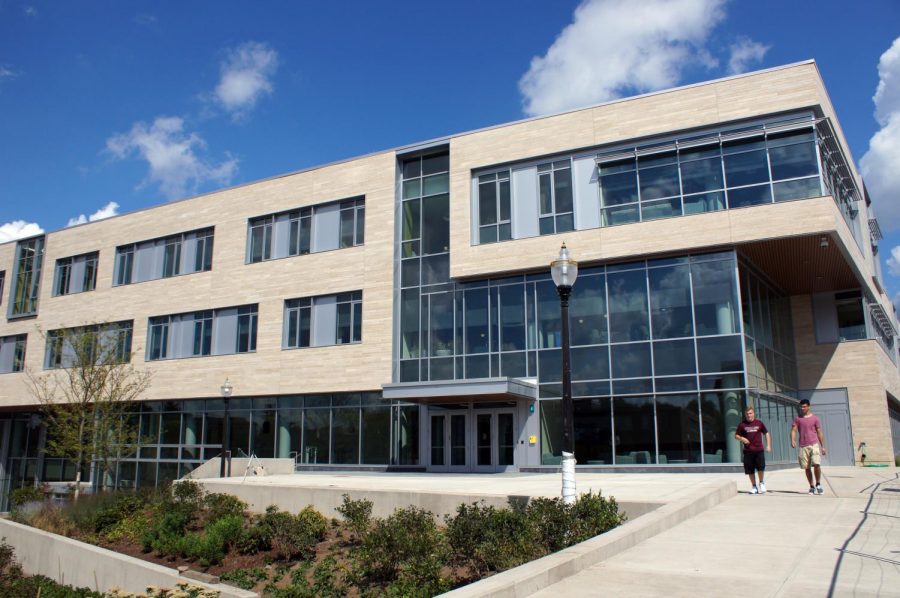The Post-Landfill Action Network stopped at the University of Massachusetts on their Point of Intervention Tour to promote the development of student involvement on campus issues.
On Feb. 28, PLAN—an organization that spreads awareness to students about the problems with waste, as well as solutions—held a workshop in the Integrative Learning Center focusing on issues regarding the waste crisis, especially pertaining to plastic, and ways to implement not only wide-scale change, but also change on campus communities. PLAN works with colleges and universities all over the U.S. to encourage waste reduction initiatives, including UMass.
Since the latter half of the 20th century, plastic production has continuously been increasing. PLAN campus coordinator Adina Spertus-Melhus pointed out just how much plastic has integrated into people’s everyday lives by identifying all the plastic in the room during the lecture, from the chairs audience members were sitting on to the technology people use daily.
Acknowledging the beneficial impacts of plastic, like usage as sterile medical equipment and withstanding daily appliances, Spertus-Melhus focused solely on eliminating and reducing single-use plastics in her presentation.
Annually, global plastic production levels total about 330 million metric tons, a number that’s still growing, according to Spertus-Melhus. Annual greenhouse gas emissions will also continue to grow along with plastic production, as well as its disposal process.
The main problems with plastic include environmental toxicity and a massive global waste footprint, said Spertus-Melhus. Starting from the production point, many chemicals go into the process of creating plastic and, as a byproduct, heavy metals and greenhouse gases are emitted into the atmosphere. At the disposal point, plastic enters into waterways through degradation in landfills and into the air through incineration. By 2050, there will be more plastic than fish in the sea, she said.
As plastics make their way into the ocean through littering and pollution, they degrade and then accumulate all the toxins already present in the ocean. Through biological magnification, plastics then ultimately move up the food chain through initial consumption by animals like fish. As these persistent toxins make their way up the food chain, the problem magnifies as humans then consume these sorts of animals, which correlate with increased cancer rates, birth defects and other health risks.
Dioxins are released through the incineration of plastic and can particularly affect environmental justice communities that live by incinerators. Spertus-Melhus went on to say, “This demonstrates some of the disproportionate impact that plastic pollution can have on communities of color and low-income communities who live by incinerators.”
Spertus-Melhus also discussed preemptive and reactive approaches to dealing with plastic pollution, including through legislation, industry innovation and individual action. Different legislation action can be taken to encourage the use of reusable products, she noted, suggesting a charge on auxiliary containers, like a 10-cent increase on a bill if one does not bring their own mug into coffee shops.
Other legislation measures include the Microbead-Free Waters Act, which was enacted in 2015 but is still in the process of implementation. This act prevents the commercial distribution of products that contain plastic microbeads like soap, which can get into waterways.
“Legislative actions are connected to individual actions,” Spertus-Melhus said. “People push the change that drive these regulations and these bills…This isn’t just a top-down approach.”
Some clothing companies have made microfiber out of recycled plastic, which is innovative but ultimately perpetuates plastic pollution as the microfiber can enter waterways when they get washed. One industry innovation, Spertus-Melhus noted, was the “Guppy Friend,” a bag to place microfiber clothing into before going in the wash to catch the debris and keep it out of waterways.
When speaking about individual action, Spertus-Melhus said, “There is so much more to what an individual can do when it comes to reducing their waste. It’s not just reduce, reuse, recycle. There is reduce, reuse, refuse, recycle, compost and repair…creating a culture of DIY [Do it yourself] and a culture of finding things useful and reframing the way we look at our relationship with stuff and our relationships [with] each other.”
“How can we demand action and demand change as citizens rather than consumers? We want to demand changes, demand legislation action, demand industry innovation and work on building those solutions ourselves,” she added.
Spertus-Melhus then gave steps for students to enact change regarding plastic consumption on their campuses. The first step was to research the topic and determine goals, then to engage with stakeholders who have the power to get involved and want to get involved, and finally creating a plan of action to achieve those goals.
Some campus initiative successes, Spertus-Melhus noted, include one at the University of California Los Angeles, where students banned the sales of microbeads on campus through a student government referendum. This was then approved by the school’s administration and ended with procurement contracts with campus vendors.
Following the presentation, attendees broke up into groups to discuss targets and plans relating to reducing campus plastic consumption.
“It’s good to know the actual chemical effects it has and also how you can make a difference,” said Abigail Campbell, a senior animal science major and natural resource conservation minor at UMass. “It’s cool that different students here have implemented so many changes already.”
Ansley Pope, a tour coordinator at PLAN, believes that students have the ability to implement change on their campuses. He said, “Any space we [PLAN] occupy, we want to cultivate, educate and inspire students to do initiatives that fuel their passions and shift culture on campus.”
Bonnie Chen can be reached at [email protected] and can be followed on Twitter @bonnie_chen.




















Bruce Campbell • Apr 12, 2018 at 4:22 pm
It is awesome that UMass students and other students are so actively involved and making a difference both locally and globally. Keep up the great work Abigail and others. Start small. Think big. You are going to change the world!